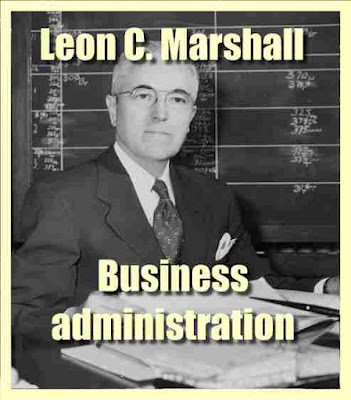Business administration Business administration - by Leon C. Marshall Collegiate training for business administration is now so widely atte...
Business administration
Collegiate training for business administration is now so widely attempted that the time has arrived when experiments should be conducted looking toward the organization of the business curriculum into a coherent whole. Training in scattered "business subjects'" was defensible enough in the earlier days of collegiate business training, but such a method cannot be permanent. It must yield to a more comprehensive organization.
There can be no doubt that many experiments will be conducted looking toward this goal; they are, indeed, already underway. This series, "Materials for the Study of Business," marks one stage in such an experiment in the School of Commerce and Administration of the University of Chicago. It is appropriate that the hypotheses on which this experiment is being conducted be set forth. In general terms, the reasoning back of the experiment runs as follows:
The business executive administers his business under conditions imposed by his environment, both physical and social.
The student should accordingly have an understanding of the physical environment. This justifies attention to the earth sciences.
He should also have an understanding of the social environment and must accordingly give attention to civics, law, economics, social psychology, and other branches of the social sciences. His knowledge of the environment should not be too abstract in character. It should be given practical content and should be closely related to his knowledge of the internal problems of management.
This may be accomplished through a range of courses dealing with business administration wherein the student may become acquainted with such matters as the measuring aids of control, the communicating aids of control, organization policies and methods; the manager's relation to production, to labour, to finance, to technology, to risk-bearing, to the market, to social control, etc.
Business is, after all, a pecuniarily organized scheme of gratifying human wants, and, properly understood, falls little short of being as broad, as inclusive, as life itself in its motives, aspirations, and social obligations. It falls a little short of being as broad as all science in its technique. Training for the task of the business administrator must have breadth and depth comparable with those of the task.
Stating the matter in another way, the modern business administrator is essentially a solver of business problems — problems of business policy, of organization, and of operation.
These problems, great in number and broad in scope, divide themselves into certain t)^e groups, and in each group, there are certain classes of obstacles to be overcome, as well as certain aids, or materials of solution. If these problems are arranged
(1) to show the significance of the organizing and administrative, or control, activities of the modern responsible manager.
(2) to indicate appropriate fields of training, the diagram on the opposite page (which disregards much overlapping and interacting) results. It sets forth the present hypothesis of the School of Commerce and Administration concerning the basic elements of the business curriculum, covering both secondary school and collegiate work.
In this curriculum, the present volume is designed to serve as part of a general introduction. It is used as the basic material in a beginner's course in Business Administration. This course parallels another dealing with the physical environment of business and follows still another which considers the social environment.
The three courses thus constitute a survey of the physical and social environments of business and a general analysis of the outstanding relationships of the business administrator. In its scheme of presentation, I think of this volume as being made up of four parts.
Chapter I, a very brief first part, presents a general view of the field of study and a certain mental attitude toward the field. Because I have no better term for this mental attitude, I call it a functional approach to the study of business administration. Chapter ii, a somewhat longer second part, examines a business problem — that of plant location— as a means of giving the student confidence in the analysis of business problems which is sketched rather abstractly in the first chapter and as a means of inducing him to think of the outstanding relationships of the administrator as highly interdependent activites.
Chapters iii-ix form a rather bulky third part of the book. Here, one after another the functions of the business administrator is discussed, with particular reference to the character of the problems involved and to the control policies and devices of the manager.
The reader will find that the book is a "what and why" book rather than a "how" book. It is not a manual of technical practices and devices in business.
It is an attempt to see the problems of business administration as an interrelated whole and to indicate the lines of study which will presumably lead to the solution to those problems.
Download Business administration 23 MB - 919 pages










